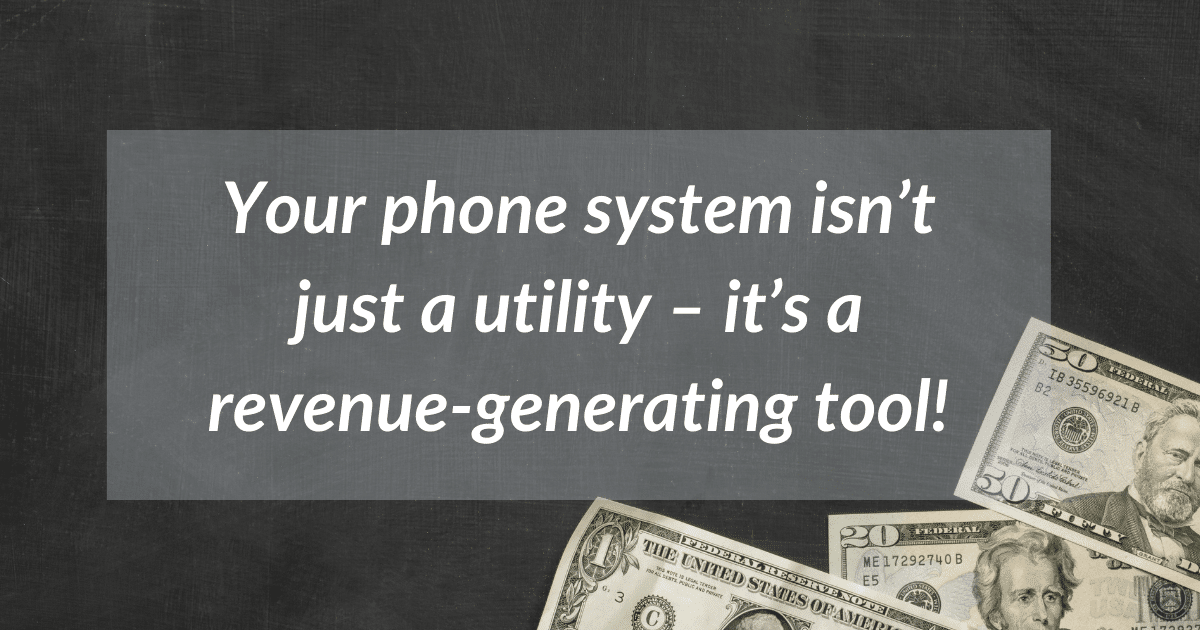Ready to find a phone system that will enhance your business? Ask yourself these ten questions before you start shopping!
There are so many phone systems out there, and if you randomly choose a demo to watch, our guess is that it will sound perfect! Why keep hunting when each option sounds like it has everything you need? Well, demos and product descriptions are tailor-made to lead with the provider’s strong suits and stay quiet about what they can’t deliver.
The smartest way to go about finding the best phone system for you and your business is to assess your own needs first. Only then can you start shopping with the right questions and expectations in mind. Don’t be distracted by deals and features that sound so good, you forget to ask about your own needs. We’ve outlined some questions to answer for yourself, prior to selecting a phone system. When you go into a demo well-prepared, you’ll end up with a phone system that truly fits your needs.
Remember first and foremost that your phone system isn’t just a utility – it’s a revenue-generating tool. Any phone system will help you call people or receive calls. Look for an option that also accelerates your ability to identify and close deals, shape your brand identity, and deliver an ROI that enhances profitability.
1. What business tools – including a CRM – do I already have in place?
There’s a good chance your company already utilizes a CRM – think Salesforce or Citrix Podio – and your tech stack isn’t changing any time soon. When choosing a phone system, it’s important to ensure that it will fit seamlessly into your established CRM.
For sales-driven businesses, integration with your CRM can save time and effort, which should be considered when determining costs. You want a system where data flows in both directions in real time.
For example, when a call comes in from a lead and your employee updates a contact’s notes, everyone else can immediately see the changes within the CRM. There shouldn’t be any extra manual effort to transcribe and relay information between your phone system and your CRM contact records.
2. Who will be using my phone system?
What types of employees will be using your phone system, and how many users will there be? Full-time employees, Part-time, Virtual Assistants, Consultants? These are all different “types” of users, though many phone systems can’t make granular distinctions.
Think about whether you want to pay by user, or whether you need flexibility in staffing due to some months having higher or lower call volume. Do you really want to have to pay an additional subscription every time you want to expand your team?
Consider, also, the controls you’ll want within the system – call monitoring for training and coaching, or the ability for an admin to queue contacts up for their employees for high volume outbound calling.
3. How much outbound calling does my team do?
Most of the phone systems you’ll be shopping will allow you to dial as much as you need – this is fairly standard in the industry. But they don’t always offer the technology to make high volume outbound calling efficient and productive. If it makes sense to bring on a power dialer for your business, how will the integration work? Is it one phone system or two that have to work together? What if one of your contacts calls or texts back – can your phone system handle it?
Ultimately, it’s not just the volume of calls you can make, but the quality of those calls and the reports you receive. Call data needs to transfer to your contact records and be available for your team members to see, wherever they are. But you also need to be able to analyze your outbound calling from a mass perspective to ensure the calls are efficient and yielding data to increase efficiency over time.
4. What do I want my Caller Experience to be?
Flexibility and control for incoming calls can greatly improve your customer experience. If it’s important for a call to be answered rather than go to a voicemail, choose a phone system that allows you to program the sequence in which a call is transferred, even down to how many rings per attempted employee. You may want to decide what type of call experience you want for after hours, whether you want a greeting before the ring, or if you’ll have whole teams that should be receiving a call instead of one person at a time.
Put yourself in your customer’s shoes – how can you make their experience fast, personal, and unique to your business? Then, find a phone system that will help you make that customer experience vision a reality.
5. Does my team spend time out of the office?
If your employees typically spend some or most of their time away from a desk, it might be important to find a phone system that also has a mobile app, to connect your database to wherever they are. In this use case, your employees don’t need to have two phones, they can simply use their business phone numbers on their personal phone. This allows for efficiency, a separation between work and personal life for your employees, and the ability to do business wherever needed.
6. What is my marketing strategy?
Your phone system can be more than just utilitarian – it can also be an integral part of your marketing strategy. You should have the ability to quickly create phone numbers that are trackable so that you can quantifiably determine which of your campaigns are most successful. Using mailers, flyers, yard signs or digital marketing, you can track which phone numbers are yielding you the most dollars.
Your phone numbers are tools to enhance your business, not just communicate with leads and clients. Look for a system that supports your strategy – not one that requires you to mold your strategy to fit its technological constraints.
7. What kind of data do I need to make performance improving decisions?
When using a cloud-based phone system, so much information is being stored and should be made available for reporting. The ability to compile and analyze data is made possible with a great phone system: the best time of day to call, which agents are performing well, which lead lists are yielding sales.
Don’t just seek out a phone system that lets you make calls; that’s the absolute bare minimum. Look for a phone system that yields data to improve performance. Use your phone system to find your most valuable marketing channels and cut the rest.
8. What resources do I have to manage the phone system?
Most businesses are looking for a phone system that is easy to use right out of the gate, but how is this being facilitated by the phone system provider? Some companies have administrators, developers, or an established point person on staff to handle their phone systems, while other businesses need a system that can be administered by anyone on the team.
Maybe your goal is to find a phone system that is well-documented, offers guidance for many types of learning styles (written, videos, how-to guides, user support groups) and also has a responsive support team. When being able to make a high volume of calls is linked to your revenue, waiting to hear back about a ticket for a day or more might be unacceptable. A phone system provider with live support and established documentation will save you time and money.
9. Does my phone enhance my brand?
Though it might seem like your phone system is an invisible part of your business, customers respond to subtle cues, whether they realize it or not. Is your area code local, or toll-free? Many people trust and migrate towards businesses that have an area code they recognize – check which phone systems offer phone numbers in many area codes. And what’s your IVR menu when someone calls? Is it your voice, welcoming them to the menu? Consider the personal touches that a phone system can add to your user experience, because it might be the difference between someone choosing you over a competitor.
10. What is a good phone system worth to me?
Cost will always be a deciding factor in any purchasing decision, but it’s not as simple as “the cheaper the better.” Consider the fact that many services a phone system can offer save you time, which is important to calculate in your costs.
Build your own ROI calculation that takes into account factors such as whether your data will be cleaner and more accurate, whether there are power automations to save time, or marketing insights that drive strategic decisions. If you go with the cheapest option, but it’s burdensome, has poor customer support, and you lose customers due to their call experience – did you actually save money?
Choosing a phone system is personal to your business, but try to keep in mind how it will affect not only your wallet, but also your employees, your customers, and your own day-to-day experience. Saving time is the holy grail of many sales-based companies, so consider which phone systems help you with efficiency. Once you have an idea of how you’d like to use a phone system to profitably grow your business, then the questions you will ask of your providers become more clear. Make sure you’re in control of the conversation, and that the system is a good fit for YOU!





